Did we pique
your interest?
Of course, Hanna will be attending Transport Logistic Munich. It’s a true home game for her – and one she’s 100% looking forward to: ‘We’ve never felt such a sense of urgency: geopolitics, container flows, resilience, sustainability… there are so many pressing topics. We have an enormous task ahead of us in logistics, and it’s a challenge being faced by every country in Europe.’ She emphasises, ‘It’s a challenge for everyone working in the supply chain, whether you’re container shipping company or rail operator. ‘TLM is a great opportunity to connect with one another and celebrate those connections. Our relationships need to be rock solid, and that’s the foundation I want to build together in Munich.’
In her role, Hanna wants to reach a large network to discuss the importance of containers. ‘You have to keep improving continuously, but always with an ideal vision in mind. That’s what it’s all about: preserving the level of prosperity we have today, so we can build on it for the future.’ And in that context, Hanna sees many things – like having avocados and strawberries year-round – as ‘nice to haves.’ What does she truly dream of? Peace. And the hope that her child can grow up without ever knowing war. Still, Hanna ends things on a light note. ‘Her’ containers carry an incredible range of products, so which product could she absolutely not live without? She thinks for a moment: ‘Coffee. Without coffee, you definitely don’t want to join me for that first meeting of the day. Coffee from South America please!’
Her team includes people of almost all ages, ranging from 26 to 62, and focuses on collaboration with logistics and global regions. ‘We've managed to make sustainability a natural part of our goals, and now resilience is part of that too. What if there are disruptions? We want to be prepared for that.’ According to Hanna, what truly defines her team is: ‘There’s a tremendous amount of love, passion and pride for the port – and of course, for the container itself.' She laughs, 'Lots and lots of love for the box.’
And Hanna has big plans for that box. Her mission is to continuously improve, enhance the resilience of the supply chain and ensure a seamless and efficient connection between the sea and the hinterland. ‘It’s an idealistic goal – I'm very optimistic and idealistic, but I'm also a realist. There’s still a lot of room for improvement. We’re growing in the container segment and, at the same time, we’re witnessing global changes due to geopolitics. And that has a huge impact. The pressure on the entire corridor system is increasing, as more and more containers are coming off a single vessel. Everything needs to come together more efficiently with seamless integration.’ She continues: ‘How do we get containers here in a reliable and sustainable way?’ She's convinced there is momentum right now. ‘We have insights; we can measure things clearly and that's helping us speed up systemic change.’ She also highlights behavioural changes as part of the solution, noting that ‘there's significant room for improvement in collaboration among logistics partners.’ She points out the many different interests at play: ‘Some make money precisely from the lack of transparency and there’s resistance when you want to shine a light into the darkness. But I strongly believe transparency in the supply chain will come eventually – and when it does, I’d rather be involved right now in shaping what it looks like. Bringing everyone on board is difficult; from our perspective, it’s easier said than done and I’m aware of that.’ But she is determined: ‘The whole system needs improvement, and we need everyone on board to make that happen.’
Transport Logistic Munich (2-5 June)
Telling the story
Love for the ‘box’
'Always go from practice to theory, not the other way around.'
'There’s a tremendous amount of love, passion and pride for the port – and of course, for the container itself.'
'Containers are the backbone of society.'
Between CEOs and truck drivers
Everyone at the table
Everything comes in a container
Despite – or perhaps because of – the complexity, Hanna can't imagine a better working environment: ‘Sometimes, in the morning, I’m talking to CEOs of major shipping companies, and later that afternoon, I’m on a call with a truck driver stuck in traffic at Maasvlakte.’ She recalls one truck driver in particular: ‘Rene Lindeman, he was a wonderful man. Sadly, he has passed away. I spoke with him regularly and I'll never forget him saying “Hanna, you have to promise me one thing, always go from practice to theory, not the other way around.” She believes it’s important understand the realities on the ground first, and then explore what's actually achievable. Her ambition is to minimise the gap between practice and the Port of Rotterdam Authority – ‘we really have to tackle this together, side by side.’ She enjoys balancing the strategic and the operational: ‘Balance is something I truly value. I always seek balance in everything I do, and I'm always mindful of it. I can quickly sense when the scales are tipping in the wrong direction.’
She and her team are committed to a multimodal approach, with all players in the supply chain represented at the table. ‘It starts with a shared understanding of where we stand today: this is what we can realistically handle; this is how the market is developing; these are scenarios for how the market might evolve; this is how the hinterland is going to respond. So far, we’ve been focused on improving modalities. But what was missing was a place – a table– where you could talk about the entire system.’ She wants everyone to work together to find solutions so that eventually, everyone stands behind the same priority list. ‘I'm absolutely convinced that this is what we need to do.’
‘I believe you perform at your best, build strong networks and gain trust when you stay true to yourself,’ Hanna says. And performing is essential because the container sector is booming. According to Hanna, there are hardly any products that haven’t been inside a container. Groceries from the supermarket, medications, semi-finished products – you name it. Around 90% of manufactured freight is transported by vessel, with the majority in containers. ‘Containers are the backbone of society. If container transport stops, major problems will arise. And I’m certainly not talking about ‘nice to haves’: only 4.4% of products are consumer goods,’ says Hanna, who is committed to raising awareness among everyone in society. ‘Inland vessels, trucks and freight trains are the methods of transport that ensure that our supermarkets are fully stocked and that we have jobs.’ As for local production? ‘Good luck with the avocados and bananas,’ she laughs. She then adds on a more serious note: ‘We want to maintain the prosperity we have here. I fully support the idea that we should live much more in sync with the seasons when it comes to our food. And when it comes to energy, I'm also convinced we really need to be self-sufficient.’ But that massive global supply chain, handling all those products vital to our daily lives – Hanna sees it as absolutely essential: ‘We can’t take anything for granted. We tend to see everything we have available as standard, but it’s really not. We have to work incredibly hard to maintain it. Everyone in the logistics chain plays a vital role in making sure we have access to all these products.’ She cites the pharmaceutical industry as an example. ‘We're heavily dependent on India and China, which I think is pretty risky. Imagine if something goes wrong in that supply chain – people here won't have access to medication.’ And that's exactly where her idealism to improve the world comes into play: ‘We have the largest port in Europe here and with that influence, we reach a lot of people in the chain. We need to work together to ensure the security of supply.’
When asked who she is, Hanna immediately gives a very personal answer. ‘First and foremost, I am a loving mum. I put my whole heart into being a mother.’ And at the same time, she describes herself as highly career oriented. ‘I embrace contradictions. I’m a firm believer that family and work can be successfully combined, and I’m incredibly grateful that this is possible in the Netherlands. That’s definitely not the case everywhere.’ She speaks from experience, having grown up in southern Germany before moving to Rotterdam for love. ‘I come from a more traditional and conservative region,’ she explains. When Hanna was pregnant, her mother asked what she was going to choose: motherhood or her career. ‘I think that’s a very important subject. In the Netherlands, it’s far more common to combine the two. I still receive the occasional snide remark, and there is certainly more to be done in terms of equal opportunities, but we're definitely a big step ahead here.’
For a year now, she's been at the helm of the container business team at the Port of Rotterdam Authority and loving every minute of it: Hanna Stelzel is committed to creating a seamless supply chain and raising awareness about the prosperity that containers bring us every single day. ‘We can’t take anything for granted.’
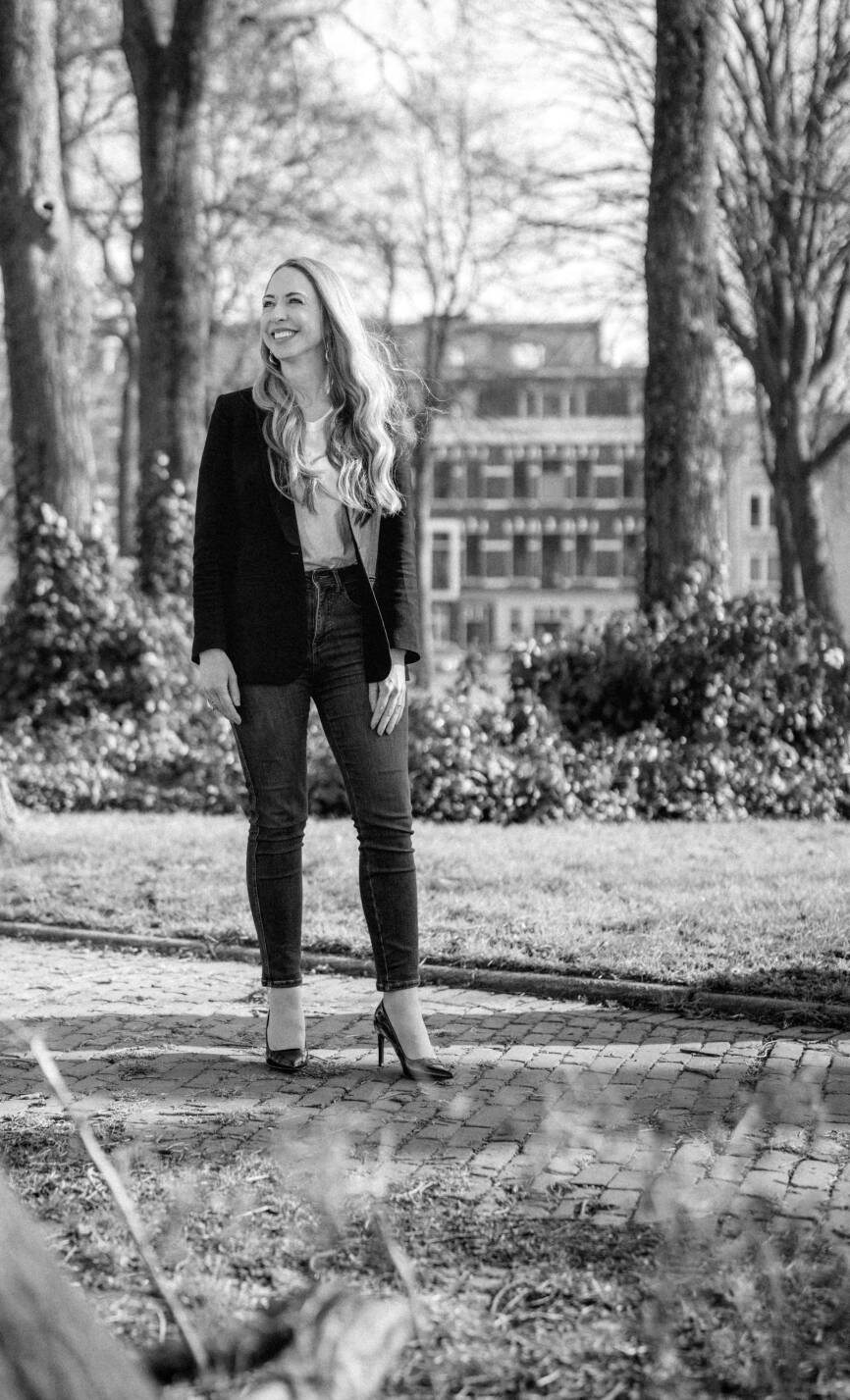
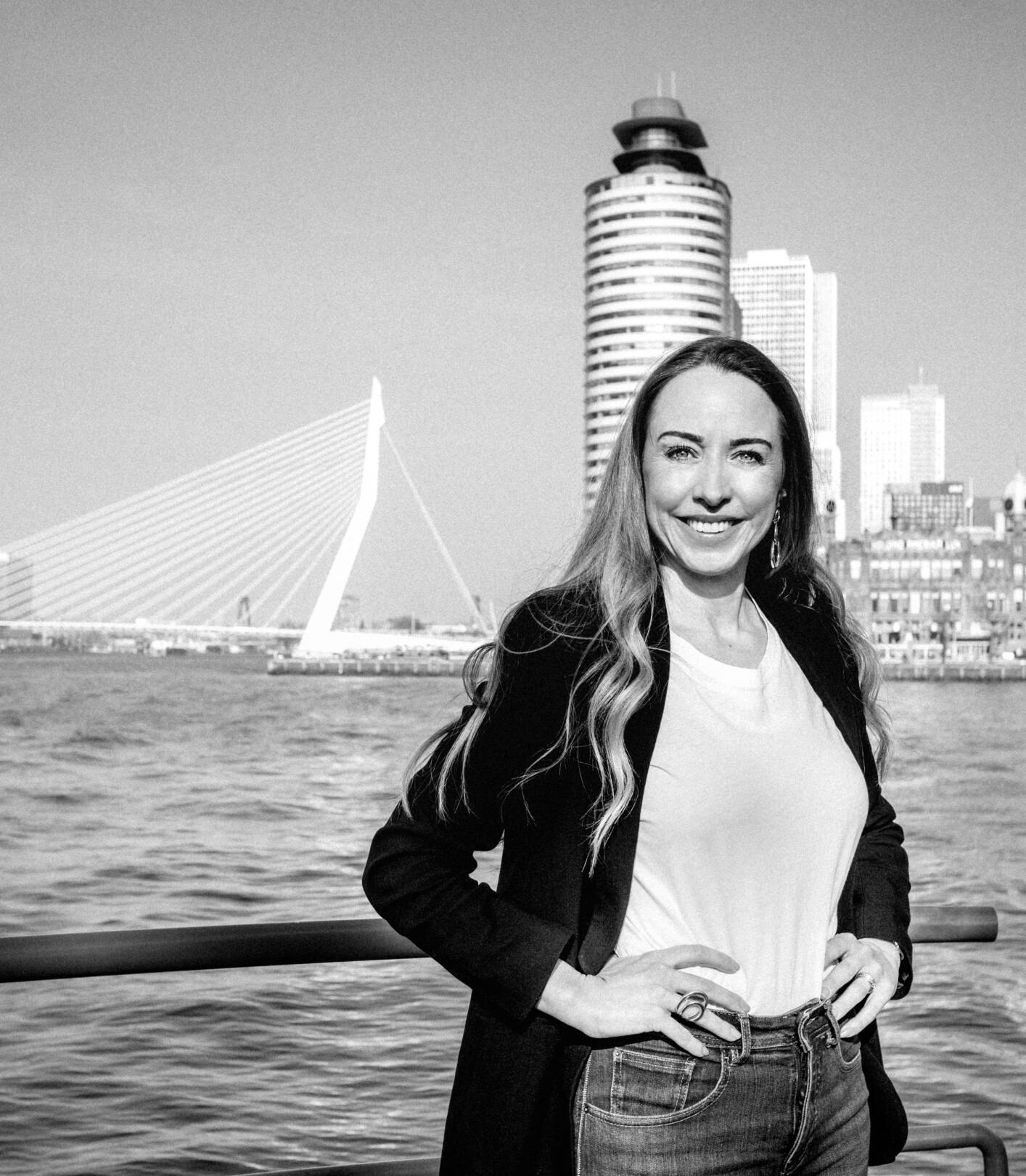
Scroll down
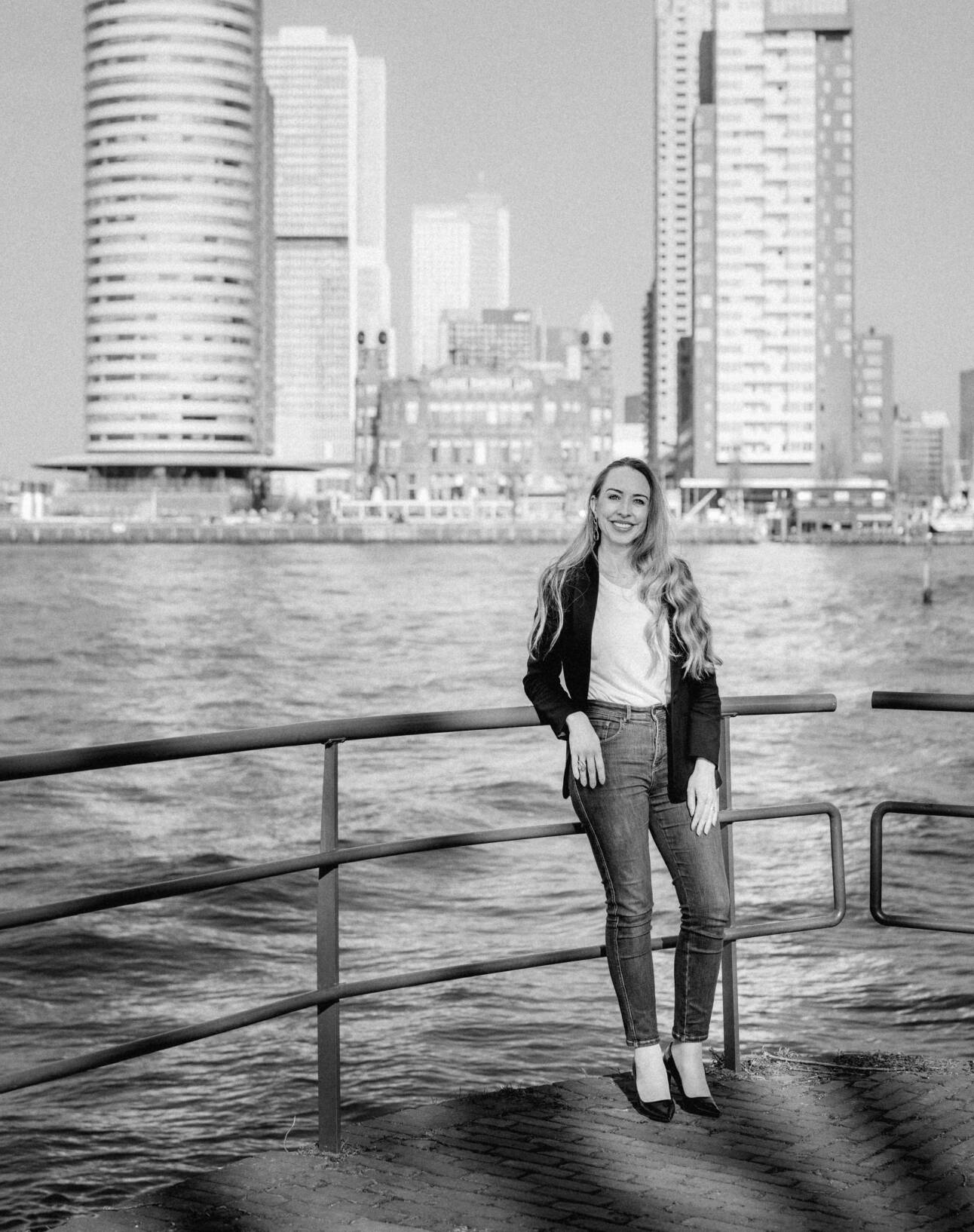
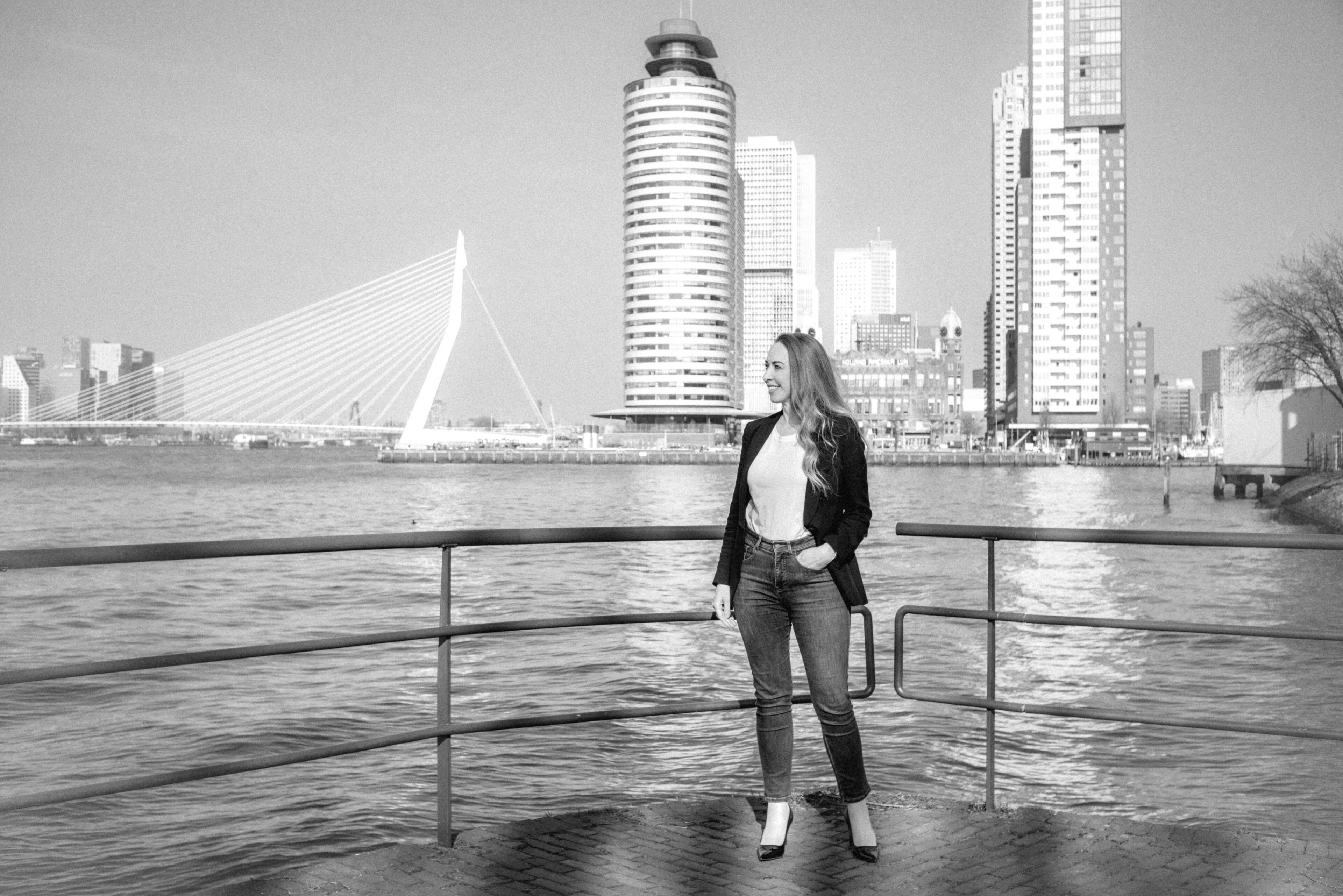
Did we pique
your interest?
In her role, Hanna wants to reach a large network to discuss the importance of containers. ‘You have to keep improving continuously, but always with an ideal vision in mind. That’s what it’s all about: preserving the level of prosperity we have today, so we can build on it for the future.’ And in that context, Hanna sees many things – like having avocados and strawberries year-round – as ‘nice to haves.’ What does she truly dream of? Peace. And the hope that her child can grow up without ever knowing war. Still, Hanna ends things on a light note. ‘Her’ containers carry an incredible range of products, so which product could she absolutely not live without? She thinks for a moment: ‘Coffee. Without coffee, you definitely don’t want to join me for that first meeting of the day. Coffee from South America please!’
Telling the story
'Always go from practice to theory, not the other way around.'
Despite – or perhaps because of – the complexity, Hanna can't imagine a better working environment: ‘Sometimes, in the morning, I’m talking to CEOs of major shipping companies, and later that afternoon, I’m on a call with a truck driver stuck in traffic at Maasvlakte.’ She recalls one truck driver in particular: ‘Rene Lindeman, he was a wonderful man. Sadly, he has passed away. I spoke with him regularly and I'll never forget him saying “Hanna, you have to promise me one thing, always go from practice to theory, not the other way around.” She believes it’s important understand the realities on the ground first, and then explore what's actually achievable. Her ambition is to minimise the gap between practice and the Port of Rotterdam Authority – ‘we really have to tackle this together, side by side.’ She enjoys balancing the strategic and the operational: ‘Balance is something I truly value. I always seek balance in everything I do, and I'm always mindful of it. I can quickly sense when the scales are tipping in the wrong direction.’
Between CEOs and truck drivers
She and her team are committed to a multimodal approach, with all players in the supply chain represented at the table. ‘It starts with a shared understanding of where we stand today: this is what we can realistically handle; this is how the market is developing; these are scenarios for how the market might evolve; this is how the hinterland is going to respond. So far, we’ve been focused on improving modalities. But what was missing was a place – a table– where you could talk about the entire system.’ She wants everyone to work together to find solutions so that eventually, everyone stands behind the same priority list. ‘I'm absolutely convinced that this is what we need to do.’
Everyone at the table
'There’s a tremendous amount of love, passion and pride for the port – and of course, for the container itself.'
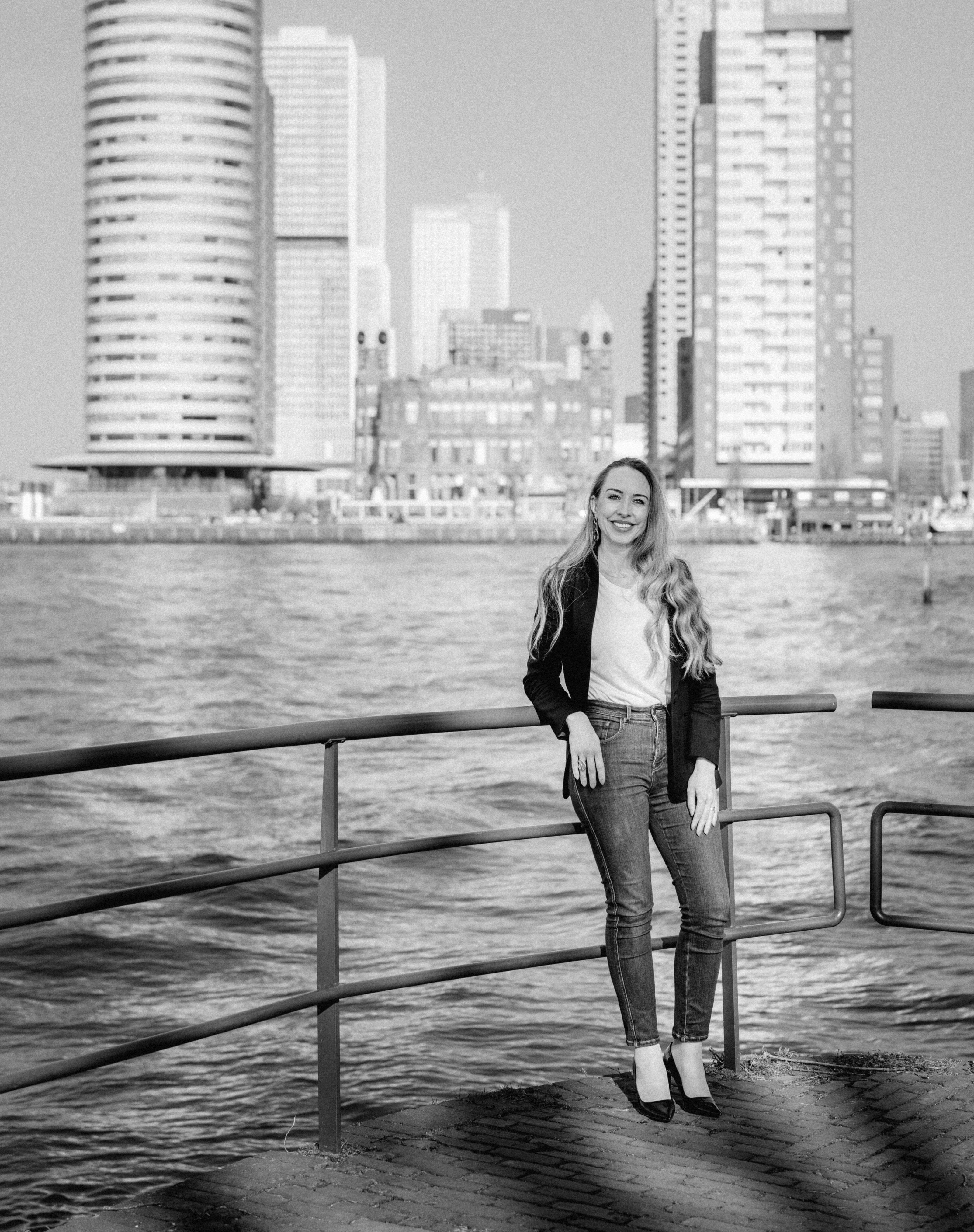
Her team includes people of almost all ages, ranging from 26 to 62, and focuses on collaboration with logistics and global regions. ‘We've managed to make sustainability a natural part of our goals, and now resilience is part of that too. What if there are disruptions? We want to be prepared for that.’ According to Hanna, what truly defines her team is: ‘There’s a tremendous amount of love, passion and pride for the port – and of course, for the container itself.' She laughs, 'Lots and lots of love for the box.’
And Hanna has big plans for that box. Her mission is to continuously improve, enhance the resilience of the supply chain and ensure a seamless and efficient connection between the sea and the hinterland. ‘It’s an idealistic goal – I'm very optimistic and idealistic, but I'm also a realist. There’s still a lot of room for improvement. We’re growing in the container segment and, at the same time, we’re witnessing global changes due to geopolitics. And that has a huge impact. The pressure on the entire corridor system is increasing, as more and more containers are coming off a single vessel. Everything needs to come together more efficiently with seamless integration.’ She continues: ‘How do we get containers here in a reliable and sustainable way?’ She's convinced there is momentum right now. ‘We have insights; we can measure things clearly and that's helping us speed up systemic change.’ She also highlights behavioural changes as part of the solution, noting that ‘there's significant room for improvement in collaboration among logistics partners.’ She points out the many different interests at play: ‘Some make money precisely from the lack of transparency and there’s resistance when you want to shine a light into the darkness. But I strongly believe transparency in the supply chain will come eventually – and when it does, I’d rather be involved right now in shaping what it looks like. Bringing everyone on board is difficult; from our perspective, it’s easier said than done and I’m aware of that.’ But she is determined: ‘The whole system needs improvement, and we need everyone on board to make that happen.’
Love for the ‘box’
'Containers are the backbone of society.'
‘I believe you perform at your best, build strong networks and gain trust when you stay true to yourself,’ Hanna says. And performing is essential because the container sector is booming. According to Hanna, there are hardly any products that haven’t been inside a container. Groceries from the supermarket, medications, semi-finished products – you name it. Around 90% of manufactured freight is transported by vessel, with the majority in containers. ‘Containers are the backbone of society. If container transport stops, major problems will arise. And I’m certainly not talking about ‘nice to haves’: only 4.4% of products are consumer goods,’ says Hanna, who is committed to raising awareness among everyone in society. ‘Inland vessels, trucks and freight trains are the methods of transport that ensure that our supermarkets are fully stocked and that we have jobs.’ As for local production? ‘Good luck with the avocados and bananas,’ she laughs. She then adds on a more serious note: ‘We want to maintain the prosperity we have here. I fully support the idea that we should live much more in sync with the seasons when it comes to our food. And when it comes to energy, I'm also convinced we really need to be self-sufficient.’ But that massive global supply chain, handling all those products vital to our daily lives – Hanna sees it as absolutely essential: ‘We can’t take anything for granted. We tend to see everything we have available as standard, but it’s really not. We have to work incredibly hard to maintain it. Everyone in the logistics chain plays a vital role in making sure we have access to all these products.’ She cites the pharmaceutical industry as an example. ‘We're heavily dependent on India and China, which I think is pretty risky. Imagine if something goes wrong in that supply chain – people here won't have access to medication.’ And that's exactly where her idealism to improve the world comes into play: ‘We have the largest port in Europe here and with that influence, we reach a lot of people in the chain. We need to work together to ensure the security of supply.’
Everything comes in a container
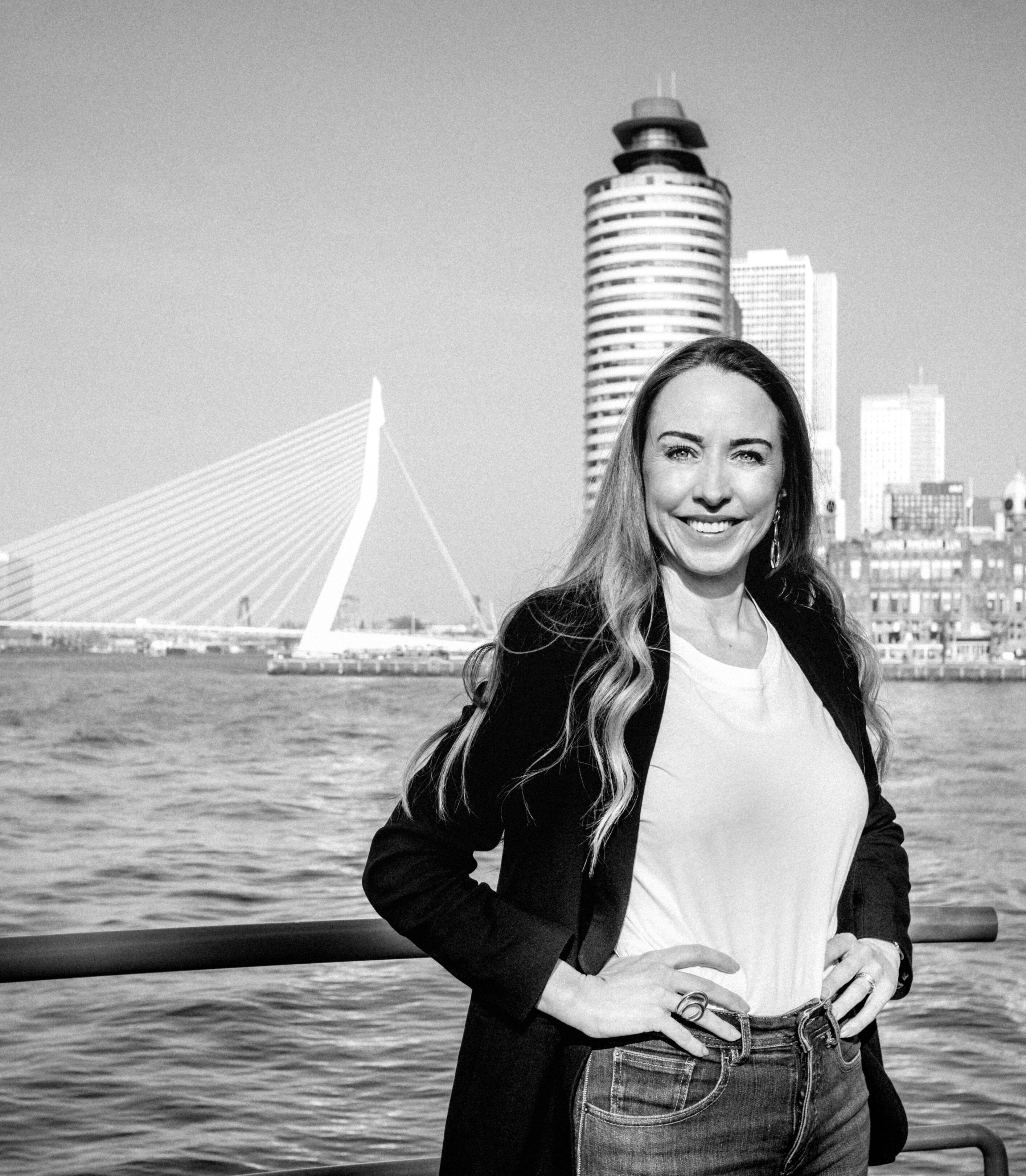
When asked who she is, Hanna immediately gives a very personal answer. ‘First and foremost, I am a loving mum. I put my whole heart into being a mother.’ And at the same time, she describes herself as highly career oriented. ‘I embrace contradictions. I’m a firm believer that family and work can be successfully combined, and I’m incredibly grateful that this is possible in the Netherlands. That’s definitely not the case everywhere.’ She speaks from experience, having grown up in southern Germany before moving to Rotterdam for love. ‘I come from a more traditional and conservative region,’ she explains. When Hanna was pregnant, her mother asked what she was going to choose: motherhood or her career. ‘I think that’s a very important subject. In the Netherlands, it’s far more common to combine the two. I still receive the occasional snide remark, and there is certainly more to be done in terms of equal opportunities, but we're definitely a big step ahead here.’
For a year now, she's been at the helm of the container business team at the Port of Rotterdam Authority and loving every minute of it: Hanna Stelzel is committed to creating a seamless supply chain and raising awareness about the prosperity that containers bring us every single day. ‘We can’t take anything for granted.’
